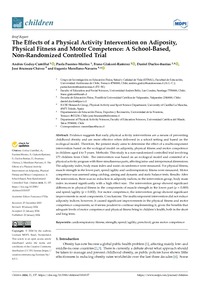Mostrar el registro sencillo de la publicación
The effects of a physical activity intervention on adiposity, physical fitness and motor competence: A school-based, non-randomized controlled trial
| dc.contributor.author | Godoy-Cumillaf, Andrés | |
| dc.contributor.author | Fuentes-Merino, Paola | |
| dc.contributor.author | Giakoni-Ramírez, Frano | |
| dc.contributor.author | Duclos-Bastías, Daniel | |
| dc.contributor.author | Bruneau-Chávez, José | |
| dc.contributor.author | Merellano-Navarro, Eugenio | |
| dc.date.accessioned | 2024-03-25T15:06:18Z | |
| dc.date.available | 2024-03-25T15:06:18Z | |
| dc.date.issued | 2024 | |
| dc.identifier.uri | http://repositorio.ucm.cl/handle/ucm/5259 | |
| dc.description.abstract | Evidence suggests that early physical activity interventions are a means of preventing childhood obesity and are more effective when delivered in a school setting and based on the ecological model. Therefore, the present study aims to determine the effect of a multicomponent intervention based on the ecological model on adiposity, physical fitness and motor competence in children aged 4 to 5 years. Methods: This study is a non-randomized controlled trial involving 173 children from Chile. The intervention was based on an ecological model and consisted of a physical activity program with three simultaneous parts, affecting intra- and interpersonal dimensions. The adiposity index, body mass index and waist circumference were measured. For physical fitness, muscle strength in the lower part, speed/agility and cardiorespiratory fitness were measured. Motor competence was assessed using catching, aiming and dynamic and static balance tests. Results: After the intervention, there was no reduction in adiposity indices; in the intervention group, body mass index increased significantly with a high effect size. The intervention group showed significant differences in physical fitness in the components of muscle strength in the lower part (p = 0.000) and speed/agility (p = 0.002). For motor competence, the intervention group showed significant improvements in most components. Conclusions: The multicomponent intervention did not reduce adiposity indices; however, it caused significant improvements in the physical fitness and motor competence components, so it seems prudent to continue implementing it, given the benefits that adequate levels of motor competence and physical fitness bring to children’s health, both in the short and long term. | es_CL |
| dc.language.iso | en | es_CL |
| dc.rights | Atribución-NoComercial-SinDerivadas 3.0 Chile | * |
| dc.rights.uri | http://creativecommons.org/licenses/by-nc-nd/3.0/cl/ | * |
| dc.source | Children, 11(1), 137 | es_CL |
| dc.subject | Cardiorespiratory fitness | es_CL |
| dc.subject | Strength | es_CL |
| dc.subject | Speed/agility | es_CL |
| dc.subject | Preschool | es_CL |
| dc.subject | Gross motor competence | es_CL |
| dc.title | The effects of a physical activity intervention on adiposity, physical fitness and motor competence: A school-based, non-randomized controlled trial | es_CL |
| dc.type | Article | es_CL |
| dc.ucm.facultad | Facultad de Ciencias de la Educación | es_CL |
| dc.ucm.indexacion | Scopus | es_CL |
| dc.ucm.indexacion | Isi | es_CL |
| dc.ucm.uri | mdpi.com/2227-9067/11/1/137 | es_CL |
| dc.ucm.doi | doi.org/10.3390/children11010137 | es_CL |



